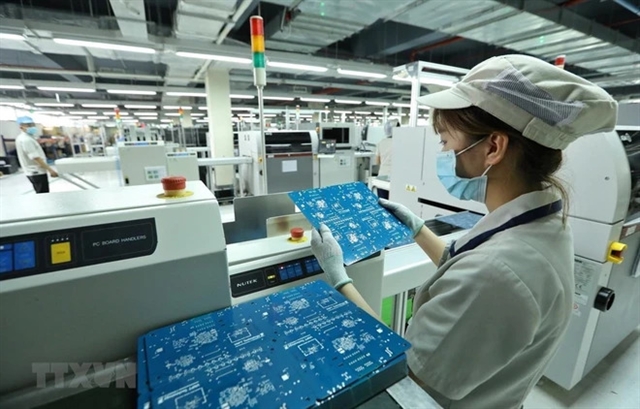Digital transformation is reshaping global industries, and Vietnam is no exception. As Vietnamese industries adopt new technologies, the workforce is evolving to meet these changes, creating fresh opportunities and new demands for tech-driven skills. This article explores how digital transformation is impacting Vietnamese workers in digital industries, highlighting the evolving skill requirements, key sectors undergoing digital shifts, and the challenges and opportunities that lie ahead.
1. The Growing Presence of Digital Transformation in Vietnam
Vietnam has emerged as a leading economy in Southeast Asia, driven by rapid industrialization and an expanding tech sector. As the country embraces digital transformation, industries from manufacturing to services are adopting new technologies. For Vietnamese workers, this shift opens doors to high-tech careers and creates a demand for digital literacy across many fields.
The Need for a Digitally Skilled Workforce
With industries increasingly adopting automation, data analytics, and artificial intelligence, Vietnamese workers in digital industries must adapt to keep pace. The demand for tech skills such as software development, data analysis, and cybersecurity is rising sharply. This trend positions Vietnam as a competitive player in the global digital economy, attracting foreign investment and boosting the demand for a tech-savvy workforce.
Example in the Tech Sector
International companies are investing in Vietnam’s tech sector, particularly in Ho Chi Minh City and Hanoi. These tech hubs have attracted IT giants that require skilled Vietnamese workers, helping position the country as a rising technology center in Asia.
2. Rising Demand for High-Tech Skills
The digital transformation underway in Vietnam is creating a need for specific tech skills across industries. For Vietnamese workers in digital industries, this means greater opportunities but also the challenge of upskilling to meet these new demands.
High-Demand Skills in Digital Industries
As Vietnamese companies incorporate digital tools, skills in programming, digital marketing, and cloud computing have become essential. Workers are increasingly expected to understand digital platforms and data-driven decision-making. Additionally, emerging technologies like blockchain and artificial intelligence require workers with specialized knowledge.
Vocational Training and Upskilling Programs
To meet the rising demand for tech skills, Vietnamese educational institutions and vocational centers are adapting their curriculums. Programs focused on programming, data analytics, and digital marketing are helping the workforce remain competitive. This shift in education is preparing Vietnamese workers to fill roles that were previously dominated by foreign employees.
3. Digital Transformation Across Key Industries in Vietnam
Digital transformation is impacting a range of Vietnamese industries, including manufacturing, finance, healthcare, and agriculture. For Vietnamese workers in digital industries, the shift toward automation and digitalization is particularly evident in these sectors, creating new roles and redefining existing ones.
a. Manufacturing: Automation and Smart Factories
Manufacturing is one of Vietnam’s core industries, and digital transformation is bringing significant changes. Many factories are adopting automation and smart technology, requiring workers skilled in operating and maintaining automated systems.
Role of Automation in Manufacturing
As more factories incorporate robotics and IoT (Internet of Things) technology, the demand for skilled workers who can oversee these systems has grown. Vietnamese workers trained in digital operations and smart factory technology are now essential for maintaining high productivity and quality in manufacturing.
b. Financial Services: The Rise of Fintech
The financial industry in Vietnam is also undergoing a digital transformation, with fintech companies introducing digital banking solutions, payment systems, and blockchain technology. This shift is creating new roles for Vietnamese workers in digital industries.
Opportunities in Fintech for Vietnamese Workers
As traditional banks and fintech startups adopt digital solutions, Vietnamese workers skilled in software development, cybersecurity, and data analytics are in high demand. This shift is changing the landscape of Vietnam’s financial sector, paving the way for jobs that require digital expertise.
c. Healthcare: Telemedicine and Digital Health Records
The healthcare sector in Vietnam is embracing digital solutions such as telemedicine and electronic health records (EHR), which streamline patient care and data management. This trend has increased the demand for healthcare professionals with digital skills.
Emerging Roles in Digital Health
The adoption of digital health tools requires workers who can manage health data securely and operate telemedicine platforms. Vietnamese workers trained in these areas are helping healthcare providers offer more efficient, tech-enabled patient care.
4. Government Initiatives Supporting Digital Workforce Development
The Vietnamese government has recognized the importance of digital transformation for the economy and is actively supporting workforce development in tech skills. Through policies and initiatives, the government aims to build a digitally literate workforce and increase the number of Vietnamese workers in digital industries.
National Programs for Digital Literacy and Tech Training
The government’s “National Digital Transformation Program” focuses on creating a digitally aware society and expanding tech education at all levels. It includes vocational training programs in tech-related fields, such as programming, digital marketing, and cybersecurity.
Collaboration with Private Sector and Educational Institutions
The Vietnamese government has partnered with private firms and educational institutions to improve digital training programs. Collaborations with companies like Microsoft and Google provide students and workers with access to resources and training in key digital skills.
5. Challenges in Adapting to Digital Transformation
While digital transformation brings many opportunities, it also presents challenges. For Vietnamese workers in digital industries, adapting to rapid technological advancements and meeting industry demands require ongoing upskilling.
Bridging the Skill Gap in Digital Professions
One of the main challenges is the skill gap between current workers and the needs of rapidly evolving industries. To address this, vocational and higher education institutions are introducing specialized courses, yet there remains a need for continuous learning to keep up with new developments.
Example of Generational Skill Gaps
Older workers may find it more challenging to adapt to digital tools, creating a gap between younger, tech-savvy employees and those who lack digital experience. This challenge is most prominent in industries like manufacturing and finance, where both manual and digital skills are often required.
6. Opportunities for Future Growth in Digital Roles
The digital economy in Vietnam is expected to expand, providing opportunities for Vietnamese workers in digital industries to explore careers in emerging tech sectors. As digital transformation accelerates, demand for specialized skills will continue to rise, particularly in fields like artificial intelligence, data science, and digital marketing.
Expansion of Digital Job Markets
Digital transformation opens up new job markets, allowing Vietnamese workers to explore tech careers that were previously unavailable. Roles in software development, cloud computing, and IT project management are increasing, especially in urban tech hubs.
Example in Artificial Intelligence and Machine Learning
As AI becomes a core component of many industries, the demand for AI and machine learning expertise is growing. Vietnamese workers skilled in these areas are finding opportunities in both local companies and international firms, making Vietnam a competitive player in advanced tech sectors.
7. Vocational Programs Preparing Workers for the Digital Shift
Vietnam’s vocational programs have expanded their offerings to cover digital skills in response to growing demand. These programs are essential for preparing the workforce to enter digital industries and meet the skill requirements of a global market.
Vocational Training Focused on Digital Competency
Vocational centers are offering courses in software programming, digital marketing, and cybersecurity. These programs enable workers to gain skills that align with the needs of digital industries, helping bridge the gap between current education and industry standards.
Case in Point: Digital Marketing Programs
As e-commerce grows, digital marketing has become an in-demand skill. Vietnamese vocational programs now offer courses that train workers in content creation, SEO, and data analytics, preparing them for roles in Vietnam’s expanding digital economy.
8. Future Outlook for Vietnamese Workers in Digital Industries
As Vietnam’s digital economy continues to grow, the future for Vietnamese workers in digital industries looks promising. With government support, investment in education, and a tech-savvy younger generation, Vietnam is well-positioned to meet the demands of the digital age.
Preparing for Industry 4.0 and Beyond
Industry 4.0, characterized by automation and smart technology, is creating new opportunities for Vietnamese workers. As companies adopt these technologies, the demand for workers with skills in IoT, robotics, and AI will continue to rise, preparing Vietnam’s workforce for a technology-driven future.
Example of Emerging Careers in Smart Manufacturing
Smart factories in Vietnam are adopting Industry 4.0 practices, creating demand for workers who can manage automated systems. Training programs focused on IoT and robotics ensure that Vietnamese workers can step into these roles and support the country’s move toward advanced manufacturing.
Conclusion
Digital transformation is reshaping Vietnam’s workforce, creating opportunities for Vietnamese workers in digital industries to thrive in tech-driven roles. From manufacturing to healthcare, the impact of technology is visible across sectors, fueling demand for a skilled and adaptable workforce. With strong government support, educational reforms, and a focus on tech-driven skills, Vietnam is positioning its workforce to meet global standards and succeed in a rapidly evolving digital landscape.
As digital industries continue to expand, Vietnamese workers are set to play a significant role in both the domestic and international tech ecosystems. By embracing technology and fostering a digital-savvy workforce, Vietnam is ensuring that its workers remain competitive in the global economy.




